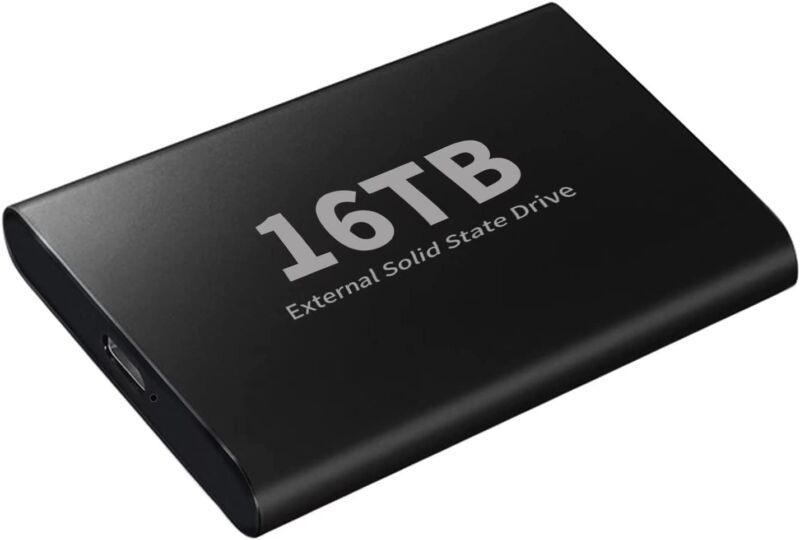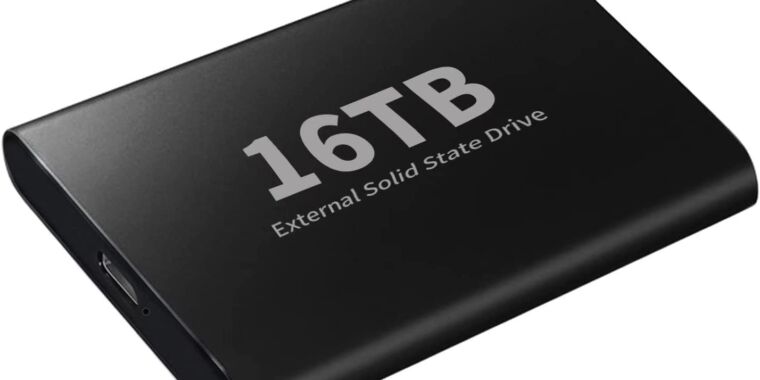
Amazon won’t deny that fraudulent reviews are a problem on its platform. And despite years of reports of fake storage products, listed with falsified reviews to cover up bogus specs and performance claims, the scammers keep coming.
On Monday, Review Geek described purchasing what an Amazon listed was a portable 16TB M.2 SSD for $70. The drive, like similar Amazon listings, had dozens of five-star reviews. Still, the cheap SSD turned out to be just a 64GB microSD in a circuit board with a USB-C connector.
This is despite the drive showing as 16 TB of storage on Windows, which Review Geek suspects is due to deceptive logic board firmware.
The listing and box weren’t even honest about connectivity, claiming USB 3.0 Micro B to USB 3.1 Type-C. The device really relies on USB 2.0, Review Geek determined after testing the product with ChipGenius, a USB device research app. Move 1 GB of data with the SSD microSD card reportedly took 20 minutes instead of the expected single minute.
Finally, the box’s claims of compatibility with smart TVs, Android, Windows 7, and Windows 10 remain questionable, and support for “|OS” seems impossible, since that’s nothing.
The good news is that Review Geek found no malware on the device.
The bad news is that this is just one example of countless that have been reported and remain scattered across Amazon over the past few years.
Inexpensive “16TB SSDs” are plentiful
After reading Review Geek’s story, I searched Amazon for a “16TB SSD” and immediately got $70-$110 options with unknown brand names, such as Generic, SAJIULAS, and WIOTA, the brand of the drive that Review Geek bought . All had at least 3.5 stars and some had hundreds of reviews.
However, reading some of these reviews, I wondered if we’ve been using SSDs wrong all along. A review of one of the remarkably cheap portable SSD offerings stated that the product was “a very colorful throw, but thinner” than expected. Another reported that the ride turned out to be “very smooth and perfect” for their 6-year-old. One review pointed out that the SSD is a “nice portrait” that looks great in the kitchen, while another five-star review noted the high mic and video quality.
I even saw a review alluding to one of the true nature of the portable SSD, stating that it’s an “affordable 64GB” option, despite the review appearing under a 16TB SSD.
As Review Geek points out, scammers have edited existing listings (including new images, titles, and descriptions) for a product until they sell an entirely different item. That way sellers can keep the high ratings and make the new product look highly valued. This also explains how portable storage can get five stars for being great to look at while eating.
Whether you call it review merging, review reuse, or review hijacking, it’s a practice that scammers have used for years to dupe PC component buyers, and one that Amazon has yet to stamp out.
History repeats itself
Unfortunately, recently there have been more and more stories about standard microSD cards masquerading as high-speed, high-capacity portable SSDs. ZDNet reported on buying a $20 copy in May, and TechRadar discussed the matter in September, noting that some Amazon listings were taken down after the article. In August, we reported on a scammer selling a 30TB portable SSD at Walmart for $39.
As for PC storage in general, there are countless reports of people getting different products than what is advertised on Amazon. And it’s not just limited to SSD storage. People have reported double bookings for cheap hard drives and USB flash drives.
Review Geek’s story reminds us how careful shoppers should be when buying suspiciously cheap technology from websites. Despite reports and subsequent deletions of rogue storage devices, they keep popping up.
According to Review Geek, the purchased product disappeared and was immediately replaced with another listing before Review Geek reported the fraud to Amazon. It’s unclear if Amazon removed the original post or if the seller did it independently before it could be penalized.
As Review Geek put it, it’s like a game of whack-a-mole for Amazon. Amazon’s review process has drawn criticism from customers, the media and the UK’s competition regulator, The Competition and Markets Authority. Amazon has gone to court to fight companies and Facebook groups that allegedly sell fake reviews. Amazon has been suing for fake reviews since 2015, but they still run rampant on the site.

